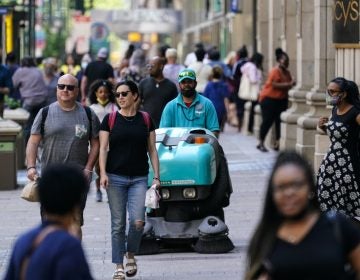Telling vets’ stories through song
Music therapy dates back to ancient times. In our country, the process of healing through music took off after World War I, when it was used in Veterans Hospitals to ease the pain and suffering of trauma victims.
Today, music therapy remains a viable form of treatment for veterans who have physical and emotional problems.
Local radio station WXPN seems to have had this in mind when it launched a program called Project Playback. Taking music therapy to a new level–they’ve introduced some of the region’s oldest and frailest veterans to the art of songwriting with the help of a Grammy award-winning artist.
It’s nap time at the Veterans Community Living Center, a retirement home in West Philadelphia. But there’s nary a yawn in a large, sunny gathering space for about 20 residents as singer-songwriter Scot Sax enters the room.
“All right, all right, how you doing? How’s everybody doin’? Hey, Miss BB,” asked Sax.
Miss BB replied: “How are you?”
“I’m good, I’m good,” said Sax.
Sax sets up his guitar. A semi-circle of men and women, mostly in wheelchairs, fans out in front of him. It’s a cast of the serene and the silver-haired, holding instruments. There are claves, maracas, and clusters of bells.
“All right, let’s start some kind of groove,” he said.
For the past few months, Sax has volunteered to write and record original songs with this crew. It’s a far cry from warming up for The Who or writing songs for country greats like Faith Hill and Tim McGraw, both of which Sax has done.
“I realized that I was about to embark on a writing session with folks between the ages of 80 and a hundred that don’t play instruments,” said Sax. “You’re not sure how present they are at all times. Some of their heads are turned or their eyes are shut or they’re slouched over. Then you start a song and they pick up a maraca or a tambourine; and, honest to god, their rhythm is dead on the money. They are completely there. They just needed to be activated and music is a great activator.”
Sax is onto something, says staff psychologist Aggie Kleczek. Residents here at the CLC, many of whom have dementia, often find it difficult to listen to complex language and to express themselves, but with music, it’s different.
“This is the one thing that engages them and makes them feel a little bit more that they are a part of the environment, and they can respond and enjoy it,” said Kleczek.
Music helps in another way, says Kleckek. Veterans with dementia and Post Traumatic Stress Disorder risk losing coping skills to deal with intrusive memories, as their cognition declines.
“They become easily agitated, have anger outbursts, and I think the music is a way to allow them to focus on something pleasurable. It’s providing them with something that they can experience and allows them to disengage from some of the negative memories,” said Kleckek.
This day, Sax has a hard time getting folks to open up. He leads by example: playing his own songs or strumming basic chords in hopes that something bubbles up, a word, a line–anything that resembles lyrics.
“These are words from last week’s song: sitting around with old heroes, rehashing memories. I can’t forget the famous vet you forgot to remember. That was from you, Miss BB,” said Sax.
Miss BB: “I don’t remember.”
Sax: “Exactly! You forgot to remember the forgetting to remember line.”
“I’m connecting with this woman Miss BB. Miss BB is the most verbal. She was a nurse in the war,” said Sax. “It was hard for her to see some of the things she saw and she’s kinda made it a practice, as she put it, forgetting to remember. We put that in a song. I mean who knows what she’s seen.”
Miss BB was an Army nurse in World War II and the Korean War. She likes to read the Bible; and when she was young, she’d make up songs.
“If you’re in a situation and something’s happening, instead of worrying about it, you could write a song about it. It relieves you of depression and stuff. Write a song and get it off your mind. Music is medicine for the soul,” she said.
Miss BB’s adage rings true for Sax who says music is the great connector.
“You can meet somebody that you have nothing in common with whatsoever. You have completely opposite lives; but as soon as the music starts, we have everything in common,” said Sax.
In the unlikely coming together of Sax and this group, the blues is the muse Sax has been hoping for.
“Mr. Broderick, you got anything for me? We need something to kick it off,” said Sax. “You got any magic phrases?”
Sax says songwriting’s an easy equation. All you have to do is tell the truth and mean it. No need to tell that to the man with the magic phrases.
WHYY is your source for fact-based, in-depth journalism and information. As a nonprofit organization, we rely on financial support from readers like you. Please give today.




